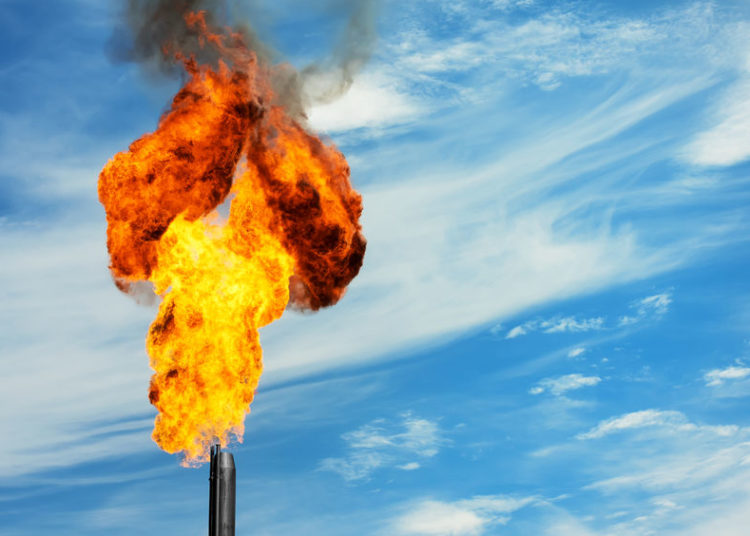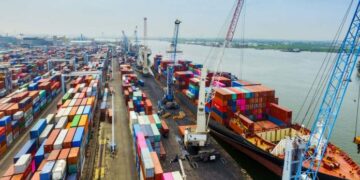Amid a nationwide energy crisis, Nigeria finds itself grappling with a peculiar irony as gas meant to alleviate power shortages is instead being wasted through flaring, leaving hundreds of thousands of homes without electricity.
Natural gas estimated at $205.7 million and capable of powering four million households was flared in Nigeria in the first two months of 2024, BusinessDay reports.
Data obtained from the Nigerian gas flare tracker of the National Oil Spill Detection and Response Agency (NOSDRA), showed the country flared about 58.8 million standard cubic feet (Mscf) in the first two months of this year with a power generation potential of 4.04 thousand megawatts (MW).
“The rule of thumb for an industrial nation is about 1MW for every thousand population,” PricewaterhouseCoopers said in a report titled Privatisation in the power sector Navigating the Transition.
With an installed generating capacity of about 13,014.14MW and an operating capacity of circa 4,000MW, according to data gleaned from the Nigeria Electricity System Operator, electric power is still a major hindrance in the country.
Nigeria, Africa’s largest oil producer, is no stranger to energy challenges. However, the recent spate of blackouts has highlighted the inefficiencies plaguing the country’s energy sector.
Most Nigerians were left in darkness, as the electricity grid, controlled from Osogbo, Osun State, collapsed at about 4:30 pm last Thursday.
The outage left swathes of the nation grappling with darkness, disrupting daily activities and exacerbating the already challenging living conditions for many Nigerians.
Businesses, homes, and essential services were affected, amplifying frustrations with the country’s unreliable power infrastructure.
Most distribution companies across the country disclosed that their feeders were out, thereby leaving their franchise area across the 36 states in darkness.
Just last month, the grid collapsed, leaving the entire country in darkness even at a time when the industry is asking customers to pay more.
In the last 10 years that the grid was privatised to overhaul the despondent state of the sector, the grid has collapsed on over 141 occasions.
Experts have emphasised the urgent need for gas commercialisation, proper regulation, development of floating liquefied natural gas (FLNG), and amendments to the Petroleum Industry Act.
Lead engineer at KEOT Synergy,
Preye David Orodu, highlighted the importance of a practical push for gas commercialisation supported by a robust infrastructure network.
He said that a portion of the liquefied petroleum gas (LPG) consumed domestically is imported, contributing to uncertainties in the supply chain.
“By promoting gas commercialisation, we can attract investment, thereby reducing our reliance on imports,” Orodu stated.
He emphasised the necessity of stimulating investment in well-designed, efficient modular processing facilities to capture flared gas at well sites, creating profitable clusters at both well sites and flow stations.
Orodu said that the success of this endeavour relies on setting appropriate gas pricing for local consumption and capitalising on additional benefits throughout the value chain beyond LPG.
According to NOSDRA, Nigeria incurred a staggering loss of $22.9 billion to gas flaring over the past decade, from 2011 to 2021.
An energy analyst, Kelvin Emmanuel, stressed the imperative of deregulating gas prices. According to him, this deregulation is pivotal to incentivising operators to commercialise the gas currently being flared, thereby curbing environmental degradation and economic losses.
Emmanuel said, “The reason this is critical is because if the cost of gas per standard cubic feet is lower than the cost of penalty for flaring, the operators will reject re-injection and opt for the fines.”
Highlighting potential solutions, Emmanuel recommended the development of Floating LNG vessels.
He emphasised that FLNG vessels can minimise the cost of building standard trains, reduce instances of vandalisation associated with conventional infrastructure, and facilitate the easy offtake of associated gas from well-heads.
Gas Flaring: Nigeria Loses 24,100 Gigawatts Hour Electricity Generation Potential
”This, in turn, eliminates the need for flaring or rejection of re-injection, presenting a more sustainable approach to gas utilization,” he said.
Meanwhile, Iziaq Salako, the minister of state for environment, announced the initiation of periodic reviews by NOSDRA to ensure both international and indigenous oil companies remain committed to ending routine gas flaring by 2030.
Salako made the declaration during the national stakeholders engagement meeting on methane mitigation and reduction in Nigeria’s oil and gas sector held in Abuja on Tuesday.
He said: “Collaborative efforts of government institutions have led to the development of methane guidelines. In addition, the Federal Ministry of Environment through the National Oil Spill Detection and Response Agency will be commencing the periodic review of the plans of international and indigenous oil companies to ensure they stay on course to end routine gas flaring by latest 2030.
“Furthermore, Nigeria is poised to embark on methane reduction projects that will enable Nigeria’s commitment to methane reduction and meeting net zero emissions by 2060. It is therefore reassuring to see initiatives such as the project methane mitigation and reduction in Nigeria’s oil and gas sector, which is being initiated with today’s event.
“This national stakeholders engagement event is expected to serve as a platform to discuss the complexities of methane mitigation and reduction within Nigeria’s oil and gas industry. Presentations here today, will provide insights and overview on existing policies, implementation strategies, including key stakeholders involved in these efforts. Through rigorous research and collaborative efforts, we can identify gaps, challenges, and opportunities for effective national actions.”
We’ve got the edge. Get real-time reports, breaking scoops, and exclusive angles delivered straight to your phone. Don’t settle for stale news. Join LEADERSHIP NEWS on WhatsApp for 24/7 updates →
Join Our WhatsApp Channel










